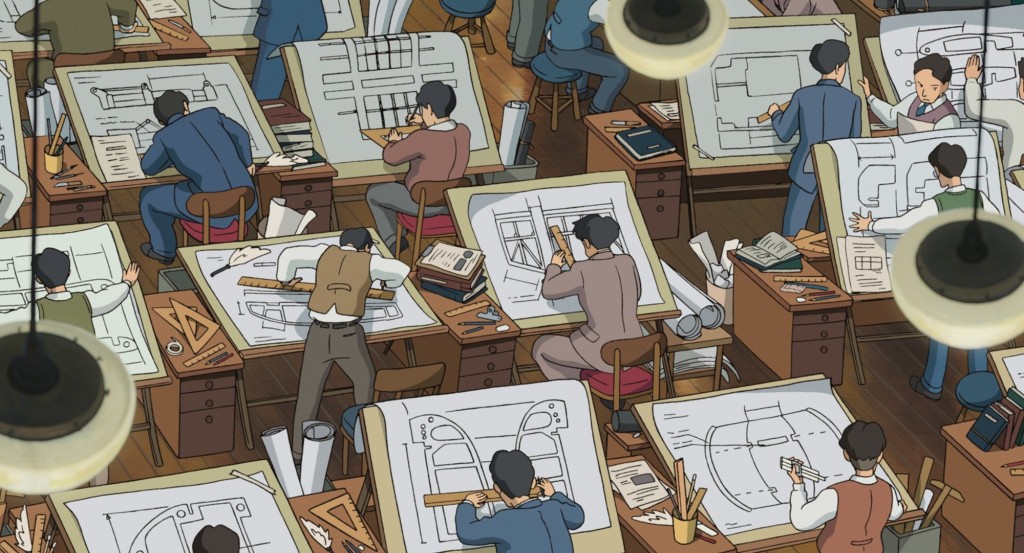03.01
Miyazaki’s latest movie proves to be a bittersweet affair in many ways. It’s both the most down-to-earth and one of the most otherworldly, with the desire to create being examined throughout the movie. Jiro really wants to make planes, even risking his life from the Nazis to pursue that dream. Despite that unstoppable awe he carries, he knows very well that his planes will be turned into bombers for the Second World War. While the war only looms in the side, that stigma always rests in Jiro’s mind. A childhood fantasy of his is turning into a tool to kill. But the war’s why Jiro’s allowed to pursue his dream, bringing up the question as to whether people should reach for greater things if it means others are crushed for that action.
Such ambiguity drives the movie from start to finish, not just in Jiro’s desire to invent but also in his personality. He’s selfless and naïve at once, believing he can build the best planes he can while knowing they’ll be used as fighters. He questions the ideals of Japanese society, but often follows them when he focuses on his work. There’s a reason why his idol keeps calling him “Japanese boy” in his dreams, because he can’t escape from those boyhood adventures. His head is up in the clouds, in all senses of the term. I would suppose he keeps that boyish charm in order to hide from what his inventions will do.
That’s not to say he’s foolish. All of the characters, while stern, often cheer him on to succeed. Despite a few rough patches, the movie portrays him as an overall good man. The problem lays in how he’s a good man in a contradictory country. The Japan portrayed in this movie is rundown, with a single earthquake turning sprawling towns into wastelands. The country can get back on its feet without the help of others, but these other countries want Japan to be subservient. There runs the implication that Japan must ally with Germany and be involved in warfare because that’s the only way it can advance as a nation. And in almost every scene, Miyazaki casts scorn on that idea. To him, he sees this as a backwards nation making a deal with the devil, twisting what could have been a purely noble ambition.
And yet, the film still wants Jiro to progress with his inventions instead of hide from them. Jiro doesn’t allow himself to let that fear of creating warplanes stop him from his goal. Instead, he looks farther and imagines what his planes will be like when the war will end. He creates with that future in mind instead of the one his employers imagine. That’s the kind of philosophy he invites, that his seeds will sprout into vibrant trees no matter what hell comes to burn them. It’s the kind of ideal only an innocent boy could have, which intersects into other parts of his life.
His relationship and eventual romance with Naoko add further conflict into Jiro’s life. He wants the happily ever after everyone craves for, but forces are at play to make that bliss short-lived. It all ties back to the basic idea of how it’s better to have loved and lost than to have never loved at all. Jiro could avoid these troubles, but that would also mean missing the apex of his life. These prospects of doom only make the fruit of the forest sweeter and well deserved. In turn, this quite possibly creates the most idealistic message Miyazaki had put in his movies. That even if our dreams end, we should still keep dreaming.
In interviews with Miyazaki, the presenters make note on how the movie’s more mature than his previous works, specifically saying that it’s more of a romance than his usual fare. Technically, they’re correct. It’s certainly one of the more personal Ghibli films, as Miyazaki has made it no secret how much he strives with his own dreams just as much as Jiro does. He even cast his undergraduate Anno for the role, making their relationship akin to Jiro and his idol Caproni. Dreamers branch out to create further dreamers, just like how Socrates begat Plato.
Overall, The Wind Rises offers another worthy entry in the Ghibli catalog. Despite the more personal tone, the whimsy still exists between the corners. Even if the magic takes a more human form, they still cast surreal spells on Jiro as he grows in the film. Like Nausicaa and Porco Rosso before it, The Wind Rises wants viewers to break away from their limited ground and reach toward the unlimited sky. That may be an old message Miyazaki brings out every now and then, but it’s definitely a good one.
